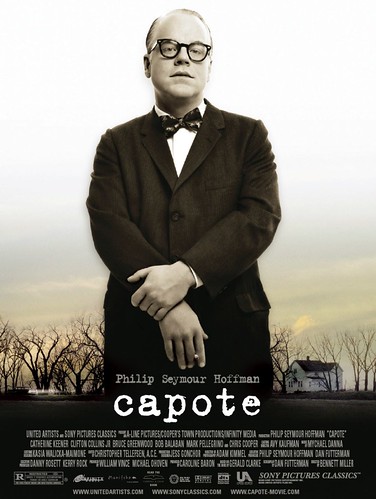
Starring Phillip Seymour Hoffman, Catherine Keener, Clifton Collins Jr., Bruce Greenwood, Bob Balaban and Chris Cooper
Directed by Bennett Miller
With popular, early literary works such as "The Grass Harp" and "Breakfast at Tiffany's" to his credit, author Truman Capote stumbled upon an article in the New York Times in 1959 that would lead to writing "In Cold Blood," largely considered one of the great pieces of non-fiction in the 20th century. It would also forever change his life – for the worse.
Focused on the several years that would go into researching, writing and finally finishing the book, "Capote" is powered by a sensational and detailed lead performance by Phillip Seymour Hoffman. His portrayal of Capote is less of an exact duplication of the diminutive author (Hoffman stands nearly six inches taller), but an uncanny channeling of his spirit. The mannerisms, flamboyance and lisp are all there, to be sure, but Hoffman takes care to avoid the temptation of making the man a caricature. His confident take on Capote is evident from his opening scene, as he holds court in the New York social scene, by enrapturing a group of friends with his storytelling prowess.
One morning, he sees an article about a Kansas farm family brutally killed in their home. While one would have to imagine that murders were not that unusual in New York, Capote took a particular fascination with the death of the Clutter family. After selling William Shawn (Bob Balaban), editor of the New Yorker, on doing a story of his own about how the small town of Holcomb, Kan., was dealing with the tragedy, he quickly finds himself in a completely different world from the Big Apple. To help him in the jarring transition, he enlists the aid of longtime friend Nelle Harper Lee (Catherine Keener), who would go onto success of her own upon writing "To Kill a Mockingbird." Lee proves to be invaluable during his early research, as she is much more approachable and less of an outside presence than Capote.
Eventually making headway with many of the town's residents, including the case's chief investigator, Alvin Dewey, Capote soon realizes he has material beyond just a magazine story. Instead, he decides to approach the story as a reporter would, with the intent of crafting his material into a full-fledged book, "a non-fiction novel," as he repeatedly tells people. His story truly comes into focus once Perry Smith and Dick Hickok, the two killers, are apprehended. He quickly takes a strong, some would say unhealthy interest in Smith (Clifton Collins Jr.), a quiet, sullen young man, who shows more of an interest in doodling on a notepad than paying attention to his trial.
When both men are found guilty and sentenced to death, Capote almost recklessly intercedes on their behalf to find them better lawyers. They didn't get sufficient representation, he reasons, managing to help draw out the legal process. But, as the film makes perfectly clear, Capote has ulterior motives for his early involvement in their case. After all, he needs them to stay alive long enough for him to get the full story of the case.
Through his repeated visits in Smith's jail cell, Capote begins to understand what makes the young criminal tick. In doing so, he realizes that he and Smith aren't too different. Both came from broken homes with neglectful mothers, and Capote soon feels empathy for how Smith's life has turned out.
"It's as if Perry and I grew up in the same house. And one day he went out the back door and I went out the front," he tells Lee.
Of course, even as he learns more about Smith, he grows frustrated at the man's unwillingness to share with him what happened that fateful night in 1959. Gaining confidence from Capote's involvement in the case, the two criminals begin a long appeal process that is a form of torture for the author. Without their execution, he has no end to his book.
Always a regular social drinker, Capote begins drinking more, falling into a deep depression over his inability to finish his book. In the process, he keeps Smith at bay by claiming he's not even come up with its name, let alone made any real progress in writing it. The scenes between Hoffman and Collins (who gives a very effective performance of his own) are pretty riveting stuff, with each character seemingly opening up his heart, even as both hold back pertinent information from each other.
Obviously, Capote eventually got his ending and finished his book. But the experience, which included being a witness to the execution, left him a shell of his former self. At the end of his five and a half year journey to create a great literary work, it would seem that the Clutters weren't the only victims.
In his desire to craft a masterful piece of non-fiction, Capote (who never took notes during his interviews, claiming to have a 94 percent retention rate) disregarded an important and generally followed rule of journalism: don't get too close.
Grade: A-
(Rated R for some violent images and brief strong language.)
1 comment:
That was a bitchin' good review my friend. Very well written. You may, someday, make a living out of writing.
[wink]
Big C
Post a Comment